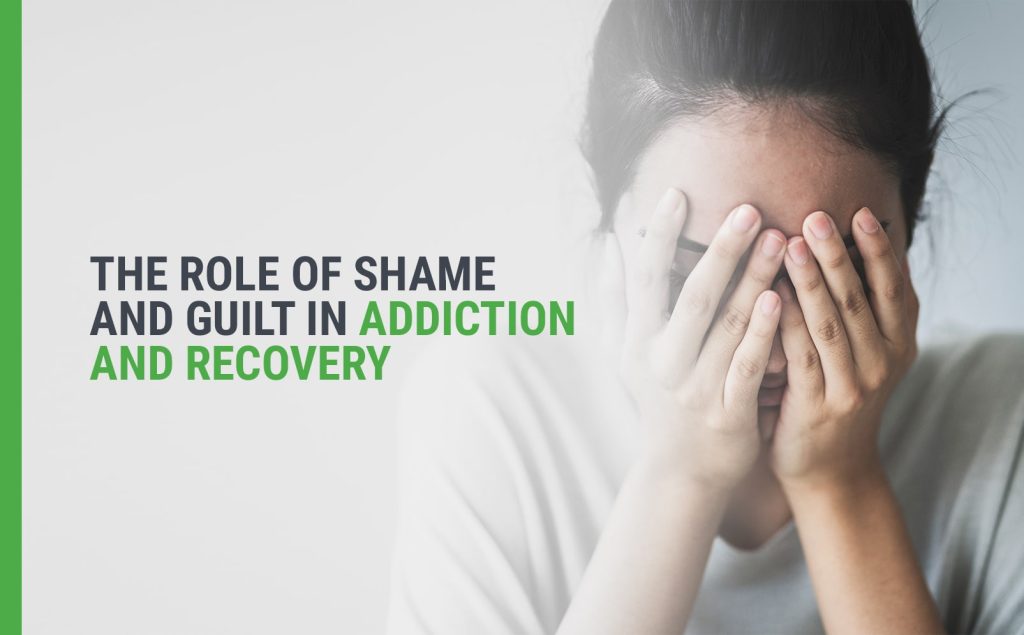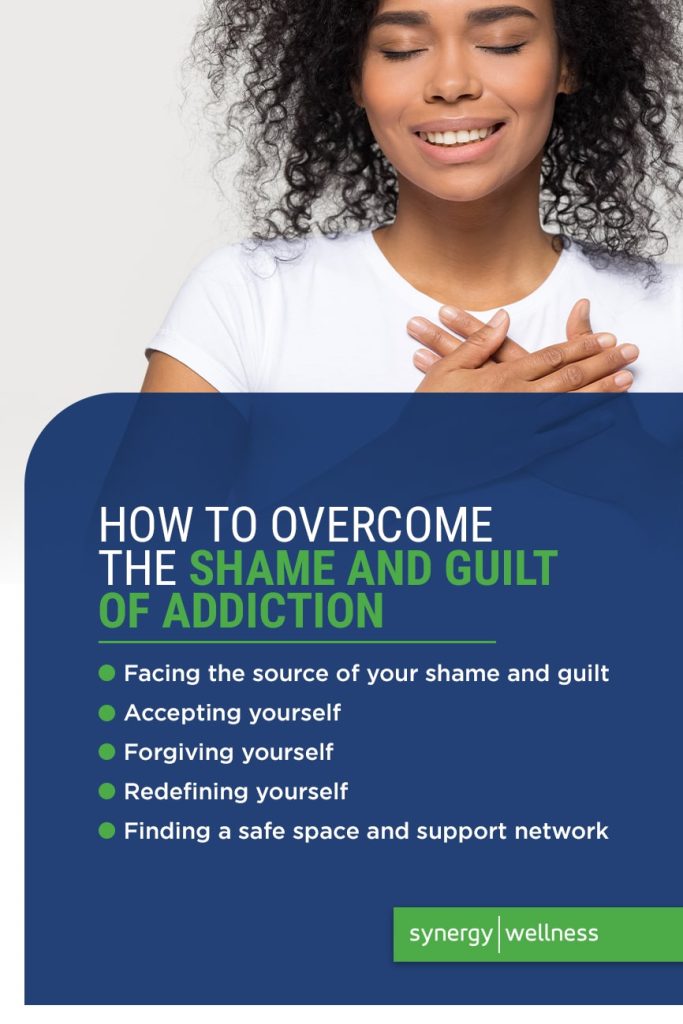
People addicted to drugs or alcohol experience various emotions, each playing a role in their substance abuse and recovery. Shame and guilt are common feelings associated with addiction and are some of the most powerful emotions a person can have. Anyone can experience these feelings as they’re linked to negative behaviors, but they can be particularly strong in people with substance use disorders.
Learn the difference between guilt and shame, the part these emotions play in the addiction recovery process and how you can overcome shame and guilt to improve your quality of life.
What Is the Difference Between Shame and Guilt?
While people often use the terms interchangeably, shame and guilt are two different emotions. These two feelings have a lot in common — they’re self-conscious emotions brought about by a perceived failure. The same action or experience can give rise to both these feelings, but there are key differences.
Shame is a feeling that reflects how we feel about ourselves, while guilt is our awareness about how our actions have affected someone else. Someone who experiences shame may view themselves as flawed somehow, whether it’s about their appearance, a disability or other perceived flaw. Guilt is a reflection of our morality, and we experience this emotion when we violate our moral standards, such as saying something hurtful to a friend, stealing from a family member or inflicting pain on another person.
While these emotions are different, they often go hand and hand. For example, if you say something hurtful to a family member over dinner, you may feel guilty for hurting their feelings and ashamed that you behaved this way.
A guilty conscious often brings about feelings of shame, but the two don’t always go together. Sometimes, a person may be ashamed of something they can’t change, such as a genetic condition or a perceived flaw in their appearance. Shame can also come from challenging social situations or trauma. Feeling ashamed can damage a person’s self-worth, bring about feelings of inadequacy and cause someone to hide from these feelings or other people.
It’s essential to distinguish between these emotions because they can inform our future actions and provide motivation for change and self-improvement. Understanding the difference between the two allows a person to take the appropriate measures to remedy the situation and develop a deeper understanding of themselves and how they react in specific circumstances.
Equipped with this knowledge, a person can take action to prevent these feelings in the future or improve their reactions to these uncomfortable feelings. Guilt can drive a person to make amends for past mistakes and actions, and shame can encourage self-improvement.
However, if a person does not recognize their responsibility and denies the negative consequences of their actions, guilty feelings may not be enough to influence repairing behaviors. People can get stuck in their shame and view themselves as worthless or undeserving. It’s easy to get caught up in these feelings, and rather than making positive changes, a person may turn to drastic measures for coping with guilt and shame.

How Guilt and Shame Affect Addiction
When people feel guilty or ashamed, they often find ways to punish themselves for their actions or thoughts about themselves. Negative thoughts can cause a downward spiral, and a person might engage in risk-taking behaviors to cope with these uncomfortable feelings.
Shame can cause feelings of failure or worthlessness and lead someone to think they aren’t loveable, don’t deserve to be happy or are defective somehow. A person who experiences shame might exhibit signs of low self-esteem, perfectionism and people-pleasing. Feelings of guilt can also bring about shame since they become disappointed in themselves for their actions towards others.
One of the ways that a person might try dealing with guilt and shame is to start using substances. Drugs and alcohol can drown out uncomfortable thoughts temporarily, which encourages a person to continue using the substances to achieve the same effect. When a person uses drugs or alcohol consistently to cope with feelings of shame, they risk developing an addiction.
Additional feelings of guilt and shame often accompany substance use disorders. People might feel ashamed of using substances and guilty about how their substance abuse affects their loved ones. Since they’re already familiar with using substances as a coping mechanism for these feelings, they may start to use more drugs or alcohol in an attempt to eliminate their shame and guilt, increasing the adverse physical, mental and emotional side effects of substance use.
Guilt and shame can also stem from actions taken because of their addiction rather than the substance abuse itself. For example, a person might steal from their friends or family members to finance their addiction, creating feelings of guilt and shame from hurting a loved one and being the type of person to commit such an act. Other examples of circumstances that can bring about these feelings include:
- Lying to friends and family about substance misuse and whereabouts
- Harming someone while driving under the influence
- Hurting yourself with the substance and reckless behavior caused by intoxication
- Falling behind on responsibilities at work or school
- Failing to show up for friends, romantic partners or children
The additional guilt or shame created by these circumstances can influence a person to continue to abuse drugs or alcohol, creating a vicious cycle.
Other Mental Health Conditions Related to Shame and Guilt
In addition to substance use disorder, shame and guilt can lead to other psychological disorders, including:
- Depression
- Anxiety disorders
- Obsessive-compulsive disorder (OCD)
- Personality disorders
- Eating disorders
While shame and guilt can result in various mental health conditions, having a mental disorder cause these feelings to surface. A person might be ashamed of their mental health and guilty for how they treat others when they’re struggling. Sometimes, mental health conditions aren’t the cause of these emotions, but they simply exist together. For example, a traumatic event in childhood can trigger a mental disorder and feelings of shame or guilt, even if these feelings are misplaced.
When a person has a mental health condition, they’re more likely to develop a substance problem. People might turn to substances to cope with their symptoms the same way they’d cope with stress or guilt. If these emotions coincide with mental health symptoms, a person is more likely to use drugs or alcohol.

Why Do People Feel Guilt and Shame During Recovery?
Shame and guilt can prevent a person from seeking treatment. People might prefer to keep quiet because they feel like they don’t have a place to share their voices or experiences. They may feel as if they’re undeserving of help and will attempt to hide the truth from their loved ones. The stigma and fear of how others will view them can prevent a person from reaching out to a medical professional for treatment or being truthful about their addiction.
If a person chooses to seek help for addiction, they may experience feelings of guilt and shame in addiction recovery. They may feel guilty for how they treated their loved ones while under the influence, whether they said hurtful things, pushed their friends and family away or became violent. They can also feel ashamed of their actions and view them as a reflection of their character. Their shame can also come from using drugs or alcohol, feeling they’ve failed rather than made a mistake.
Shame can lead to self-punishment, where a person engages in self-destructive behaviors because they feel as if they deserve to be punished. Shame and guilt can also cause a low sense of self-worth, triggering uncomfortable feelings that result in a relapse.
While these feelings can make addiction treatment challenging, they can also play a vital role in sustaining long-term recovery. Shame and guilt may be uncomfortable, but they are not always negative and can serve a purpose. Guilt from using substances in the past and hurting others can prevent a person from using again once they’ve entered treatment.
Shame and addiction often go hand-in-hand, but shame can also be one of the best motivators for addiction recovery. The shame for not living up to the idealized version of themselves and engaging in such behaviors can serve the same purpose as guilt in the recovery process. With the proper therapeutic techniques, a person’s attitude can shift where they view their shame as a tool to inspire positive change.
While these emotions can be helpful in the recovery process, you also need to address feelings of guilt and shame to prevent a potential relapse. If a person believes that they are worthless and incapable of change, shame and guilt will continue to play a part in the vicious cycle of substance abuse. It’s essential to analyze these feelings, reshape your perspective, forgive yourself for your past and move forward with a positive mindset.

How to Overcome the Shame and Guilt of Addiction
Negative feelings can hinder the recovery process by damaging your perspective of yourself and your potential to lead a sober and fulfilling life. Healing from feelings of guilt and shame in recovery is one of the more challenging aspects of treatment, but it’s possible with the proper guidance. The process for overcoming guilt and shame from addiction is:
- Facing the source of your shame and guilt: These two feelings can be uncomfortable to sort through, but understanding where they come from and how they’ve influenced your addiction is a crucial factor in the recovery process. If you’re having trouble identifying where your shame and guilt come from, a therapist can help you determine the cause and set you on a path towards a deeper understanding of yourself.
- Accepting yourself: Feelings of shame or guilt are normal among people with substance use disorders. Accepting these feelings and your past can help you cope and move forward through the addiction process. Once you acknowledge that you have a substance use disorder and the results of your past actions, you can start to make amends. Be kind to yourself and pay attention to your negative thought patterns, so you can begin to address them and heal.
- Forgiving yourself: Guilt can stem from past actions that may have hurt another person, and shame can come from a lack of self-worth due to substance use. Acknowledge your past actions and forgive yourself, knowing that you can make positive changes. Once you’ve forgiven yourself, you can see how your thinking patterns have shaped your self-worth and start making positive changes.
- Redefining yourself: It’s essential to take responsibility for your past actions, but it’s also important to continue looking forward to make positive changes. Scaffolding is a technique that focuses on transforming a person. Scaffolding focuses on the potential of a person rather than their faults. You can make amends for your past, apologize where necessary, examine your actions and make the conscious choice to redefine yourself.
- Finding a safe space and support network: You should have a place where you can address your feelings of guilt or shame, whether you confide in a friend, family member or therapist. When you have a safe space to discuss your feelings, they’ll be easier to understand, and you can adjust your thought patterns to influence positive change. You also need a support network where you can talk openly about your feelings, which can help reduce stress and increase your sense of belonging.
Shame and guilt are natural emotions to experience if you’re struggling with substance abuse, but these feelings don’t have to hold you back from seeking treatment. By following the process above, it’s possible to overcome these feelings and set yourself on the path of recovery.
While you’re undergoing treatment for addiction and overcoming feelings of shame and guilt, the goal is to forgive yourself and improve your self-worth. When you feel better about yourself, you’ll feel more empowered to face your challenges and create a new self-identity. Through treatment, you’ll learn how to develop positive thought patterns and change your perspective, helping you overcome addiction and uncomfortable thoughts.
Once you’ve tackled your feelings of shame and guilt, you’ll be less likely to relapse and better equipped to handle challenges outside of a treatment center. You’ll have an improved attitude towards yourself, encouraging you to continue making positive decisions and lifestyle changes.
Contact Synergy Recovery in Bakersfield, California
If you’re struggling with feelings of shame or guilt due to a substance use disorder, you’re not alone. These feelings are common among people who use drugs or alcohol and while they can influence addiction, you can also harness them to break the addiction cycle and improve your quality of life.
At Synergy Recovery, we can help you develop a deeper understanding of your feelings and learn how you can improve your self-worth. Our addiction treatment programs are individualized to provide you with the proper care to treat your addiction and the underlying causes. We offer medication-assisted treatment to help you detox from substances and individual or group therapy to give you the space to speak openly about your feelings. We can help you make the lifestyle changes necessary to help you overcome addiction. Contact us today to learn more about our programs and services.




